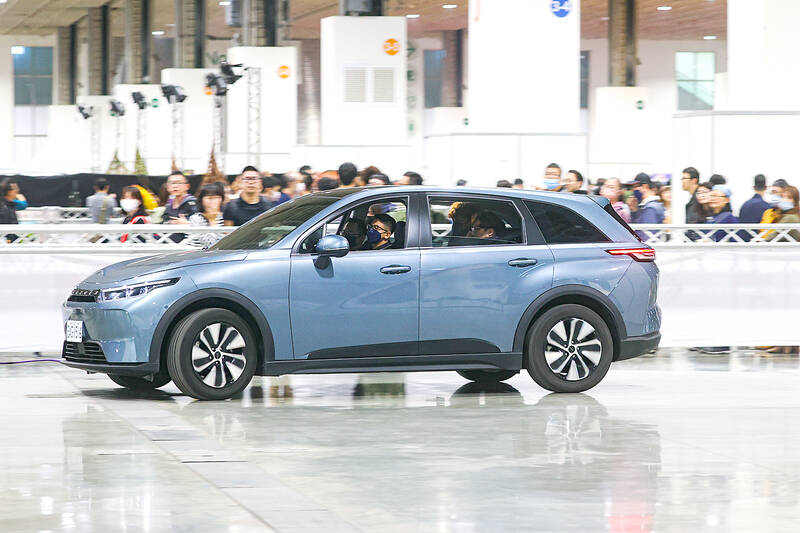New vehicle sales in Taiwan tumbled about 12 percent sequentially last month in a warning that the proposed 32 percent tariffs by the US are weighing on local consumption and new vehicle demand, auto market researcher U-Car said yesterday.
Despite a 90-day reprieve, the levies are posing a risk to the nation’s economy, along with the global economy, leading to stock market routs and volatility in foreign exchange markets globally, the researcher said.
Under such an uncertain macroeconomic environment, new car sales were affected, it said.

Photo: CNA
Sales of new cars shrank 11.82 percent month-on-month to 32,876 units last month, compared with 37,281 units in March, government statistics showed.
That fell short of an estimate of 34,000 units by a major auto distributor.
On an annual basis, new car sales dipped 11.23 percent from 37,038 units sold in April last year, the data showed.
During the January-April period, new car sales dropped 11.2 percent annually to 132,733 units.
“The contraction in new car sales in April is rarely seen and serves as a warning. Sales usually start picking up in April amid increasing promotions by car dealers after new models hit the market,” U-Car said in a report.
“Consumers are taking a wait-and-see attitude about purchasing new cars, as Taiwan is under pressure to cut duties on imported vehicles and to scrap commodity taxes on imported cars to ease US concern over Taiwan’s high tariff barriers in the auto sector,” the research house said.
Taiwan slaps up to 52.5 percent duties on imported vehicles, including an import duty of 17.5 percent, a 25 percent to 30 percent commodity tax and a business tax of 5 percent, according to the Ministry of Finance.
New vehicle sales this month are expected to rebound slightly to 35,000 units, a local car distributor forecast.
However, on a year-on-year basis, it would mean a widening decline of 16 percent.
Last month, sales of Toyota and Lexus cars dropped 12.94 percent to a combined 12,463 units, compared with 12,463 units in March, according to statistics provided by Hotai Motor Co (和泰汽車), which distributes the Japanese brands.
That meant 2.8 percent annual growth, and gave Hotai a 37.9 percent local auto market share.
Tesla Inc registered sales of 163 cars last month, bringing the total annual sales as of last month to 2,799 units.
That placed the US electric car vendor in seventh place among imported brands.
Sales of the n7 from local electric car brand Luxgen Motor Co (納智捷汽車) surged 88.9 percent to 271 units last month. Since January, Luxgen has sold 1,391 units, the government data showed.
The Luxgen n7 is designed by Foxtron Vehicle Technologies Co (鴻華先進), a joint venture between Hon Hai Precision Industry Co (鴻海精密) and Yulon Motor Co (裕隆汽車).

Taiwanese suppliers to Taiwan Semiconductor Manufacturing Co. (TSMC, 台積電) are expected to follow the contract chipmaker’s step to invest in the US, but their relocation may be seven to eight years away, Minister of Economic Affairs J.W. Kuo (郭智輝) said yesterday. When asked by opposition Chinese Nationalist Party (KMT) Legislator Niu Hsu-ting (牛煦庭) in the legislature about growing concerns that TSMC’s huge investments in the US will prompt its suppliers to follow suit, Kuo said based on the chipmaker’s current limited production volume, it is unlikely to lead its supply chain to go there for now. “Unless TSMC completes its planned six

Intel Corp has named Tasha Chuang (莊蓓瑜) to lead Intel Taiwan in a bid to reinforce relations between the company and its Taiwanese partners. The appointment of Chuang as general manager for Intel Taiwan takes effect on Thursday, the firm said in a statement yesterday. Chuang is to lead her team in Taiwan to pursue product development and sales growth in an effort to reinforce the company’s ties with its partners and clients, Intel said. Chuang was previously in charge of managing Intel’s ties with leading Taiwanese PC brand Asustek Computer Inc (華碩), which included helping Asustek strengthen its global businesses, the company

Power supply and electronic components maker Delta Electronics Inc (台達電) yesterday said second-quarter revenue is expected to surpass the first quarter, which rose 30 percent year-on-year to NT$118.92 billion (US$3.71 billion). Revenue this quarter is likely to grow, as US clients have front-loaded orders ahead of US President Donald Trump’s planned tariffs on Taiwanese goods, Delta chairman Ping Cheng (鄭平) said at an earnings conference in Taipei, referring to the 90-day pause in tariff implementation Trump announced on April 9. While situations in the third and fourth quarters remain unclear, “We will not halt our long-term deployments and do not plan to

TikTok abounds with viral videos accusing prestigious brands of secretly manufacturing luxury goods in China so they can be sold at cut prices. However, while these “revelations” are spurious, behind them lurks a well-oiled machine for selling counterfeit goods that is making the most of the confusion surrounding trade tariffs. Chinese content creators who portray themselves as workers or subcontractors in the luxury goods business claim that Beijing has lifted confidentiality clauses on local subcontractors as a way to respond to the huge hike in customs duties imposed on China by US President Donald Trump. They say this Chinese decision, of which Agence